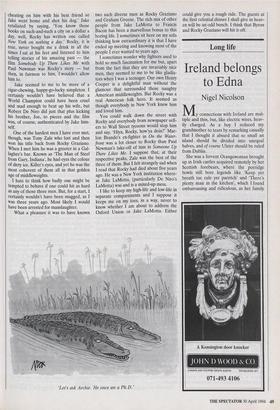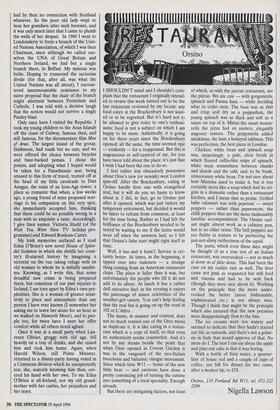Long life
Ireland belongs to Edna
Nigel Nicolson
My connections with Ireland are mul- tiple and thin, but, like electric wires, heav- ily charged. As a boy I reduced my grandmother to tears by remarking casually that I thought it absurd that so small an island should be divided into unequal halves, and of course Ulster should be ruled from Dublin.
She was a fervent Orangewoman brought up in Irish castles acquired remotely by her Scottish forebears, where the porridge bowls still bore legends like 'Keep yer breath tae cule yer parritch' and 'There's plenty mair in the kitchen', which I found embarrassing and ridiculous, as her family had by then no connection with Scotland whatever. So the poor old lady wept to hear her grandson utter such heresies, and it was only much later that I came to plumb the wells of her despair. In 1960 I went to Londonderry to form a branch of the Unit- ed Nations Association, of which I was then Chairman, since although we called our- selves the UNA of Great Britain and Northern Ireland, we had but a single branch there, in Belfast. My mission was futile. Hoping to transcend the sectarian divide (for that, after all, was what the United Nations was all about), I encoun- tered insurmountable resistance to my naive proposal that the chair of the branch might alternate between Protestant and Catholic. I was told with a derisive laugh that the notion would not survive a single Paisley blast.
Only once have I visited the Republic. I took my young children to the Aran Islands off the coast of Galway, famous then, and still famous, for the documentary film Men of Aran. The largest island of the group, Inishmore, had roads but no cars, and we were offered the choice between bicycles and bare-backed ponies. I chose the ponies, and adopting what I hoped would be taken for a Panathenaic seat, being unused to this form of travel, trotted off at the head of my little cavalcade to Dun Aengus, the ruins of an Iron-Age tower, a place so romantic that when, a few weeks ago, a young friend of mine proposed mar- riage to his companion on this very spot, she immediately accepted him, thinking that there could be no possible wrong in a man with so exquisite a taste. Accordingly, I give their names: Victoria Studd (of the Wish You Were Here TV holiday pro- grammes) and Edward Bonham-Carter.
My Irish memories surfaced as I read Edna O'Brien's new novel House of Splen- did Isolation in which she distills her coun- try's ill-starred history by imagining a terrorist on the run taking refuge with an old woman to whom he is initially anathe- ma. Knowing, as I write this, that some dreadful new crime is being prepared there, but conscious of our past injuries to Ireland, I am torn apart by Edna's own per- plexities. She is a woman of greater sensi- tivity to place and atmosphere than any person I have ever known (I remember her asking me to leave her alone for an hour as we walked on Haworth Moor), and to peo- ple too, for twice have I seen her offer comfort while all others stood aghast.
Once it was at a small party when Lau- rence Olivier, groggy with old age, fell heavily on a tray of drinks, and she raised him and took him home. Again, when Harold Wilson, still Prime Minister, returned to a dinner-party having voted in a Commons division which he unexpectedly lost, she, scarcely knowing him then, cov- ered his hand with her own. To me Edna O'Brien is all-Ireland, not my old grand- mother with her castles, her prejudices and her tears.



























































 Previous page
Previous page